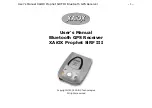
CAP 413
Radiotelephony Manual
Chapter 9 Page 3
1.5
Interceptions by Military Aircraft
Pilots are warned that should they become involved in an interception by military
aircraft they should follow the international procedures as detailed in the UK AIP ENR
Section.
1.6
Aircraft Operating Agency Messages
1.6.1
Introduction
An aeronautical radio station which is licensed and established for company
operational control communications (OPC) may be used only for communication with
company aircraft or aircraft for which the company is the operating agency. A radio
operator’s certificate of competence issued by the UK CAA is not required for the use
of this radio station.
1.6.2
Limitations
Personnel authorised to use an aircraft operating agency radio must not hold
themselves out as providing an air traffic control service, i.e. they must not pass
instructions to aircraft which could be construed in any way to be such a service.
Similar constraints apply with regard to flight information services provided by an
FISO for specific ground movements at aerodromes. Flight safety messages must be
confined to messages originated by the agency which are of immediate concern to
an aircraft in flight or just about to depart. This may include meteorological
information.
1.6.3
Aircraft operating agency radio stations may only transmit and receive flight regularity
and flight safety messages.
1.6.4
Air traffic service units using direct pilot-controller communication channels shall only
be required to handle flight regularity messages provided this can be achieved
without interference with their primary role and no other channels are available for the
handling of such messages.
1.6.5
Flight regularity messages comprise the following:
a) Messages regarding the operation or maintenance of facilities essential for the
safety or regularity of aircraft operation;
b) Messages concerning the servicing of aircraft;
c) Instructions to aircraft operating agency representatives concerning changes in
requirements for passengers and crew caused by unavoidable deviations from
normal operating schedules. Individual requirements of passengers or crew are
not admissible in this type of message;
d) Messages concerning non-routine landings to be made by the aircraft;
e) Messages concerning aircraft parts and materials urgently required;
f) Messages concerning changes in aircraft operating schedules.
1.6.6
Flight safety messages shall comprise the following:
a) Movement and control messages (e.g. flight plans, clearances);
b) Messages originated by an aircraft operating agency, or by an aircraft, of
immediate concern to an aircraft in flight;
c) Meteorological advice of immediate concern to an aircraft in flight or about to
depart (individually communicated or for broadcast);
d) Other messages concerning aircraft in flight or about to depart.
31 March 2011
Summary of Contents for 413
Page 1: ...CAP 413 Radiotelephony Manual Edition 20 www caa co uk Safety Regulation Group ...
Page 2: ......
Page 3: ...CAP 413 Radiotelephony Manual Edition 20 Safety Regulation Group 17 November 2011 ...
Page 6: ...CAP 413 Radiotelephony Manual Amendment Number Amendment Date Incorporated by Incorporated on ...
Page 10: ...INTENTIONALLY LEFT BLANK ...
Page 18: ...INTENTIONALLY LEFT BLANK ...
Page 20: ...INTENTIONALLY LEFT BLANK ...
Page 68: ...INTENTIONALLY LEFT BLANK ...
Page 126: ...INTENTIONALLY LEFT BLANK ...
Page 162: ...INTENTIONALLY LEFT BLANK ...
Page 170: ...INTENTIONALLY LEFT BLANK ...
Page 178: ...INTENTIONALLY LEFT BLANK ...
Page 206: ...INTENTIONALLY LEFT BLANK ...
Page 248: ...INTENTIONALLY LEFT BLANK ...
Page 254: ...INTENTIONALLY LEFT BLANK ...
Page 264: ...INTENTIONALLY LEFT BLANK ...
















































